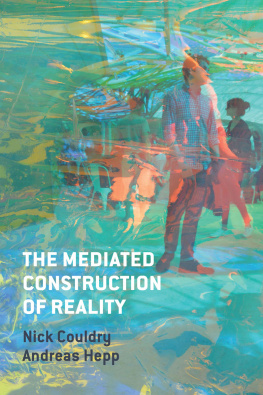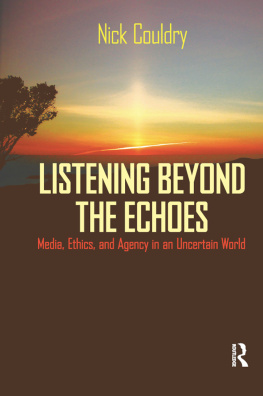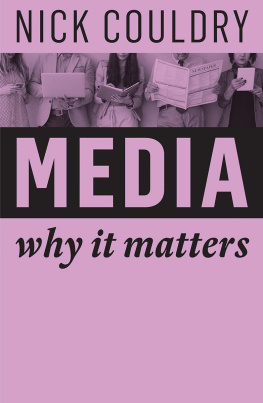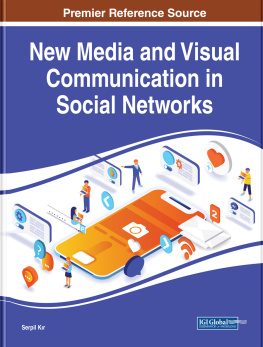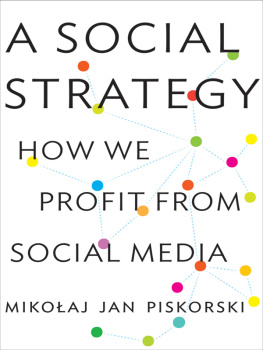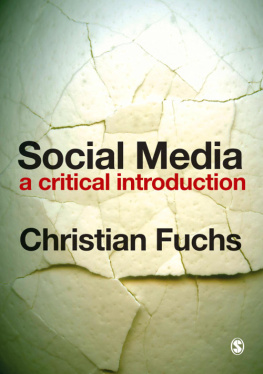Contents
Guide
Pages

The Mediated Construction of Reality
NICK COULDRY AND ANDREAS HEPP
polity
Copyright Nick Couldry and Andreas Hepp 2017
The right of Nick Couldry and Andreas Hepp to be identified as Authors of this Work has been asserted in accordance with the UK Copyright, Designs and Patents Act 1988.
Cover picture by Beate Koehler, http://beate-koehler.name
First published in 2017 by Polity Press
Polity Press
65 Bridge Street
Cambridge CB2 1UR, UK
Polity Press
350 Main Street
Malden, MA 02148, USA
All rights reserved. Except for the quotation of short passages for the purpose of criticism and review, no part of this publication may be reproduced, stored in a retrieval system, or transmitted, in any form or by any means, electronic, mechanical, photocopying, recording or otherwise, without the prior permission of the publisher.
ISBN-13: 978-0-7456-8653-0
A catalogue record for this book is available from the British Library.
Library of Congress Cataloging-in-Publication Data
Names: Couldry, Nick, author. I Hepp, Andreas, author.
Title: The mediated construction of reality: society, culture, mediatization / Nick Couldry, Andreas Hepp.
Description: Cambridge, UK; Malden, MA: Polity Press, 2016. I Includes bibliographical references and index.
Identifiers: LCCN 2016011836 (print) I LCCN 2016019395 (ebook) I ISBN 9780745681306 (hardback) I ISBN 9780745681313 (pbk.) I ISBN 9780745686523 (Mobi) I ISBN 9780745686530 (Epub)
Subjects: LCSH: Mass media--Social aspects. Mass media and culture.
Classification: LCC HM1206 .C683 2016 (print) I LCC HM1206 (ebook) I DDC 302.23--dc23
LC record available at https://lccn.loc.gov/2016011836
The publisher has used its best endeavours to ensure that the URLs for external websites referred to in this book are correct and active at the time of going to press. However, the publisher has no responsibility for the websites and can make no guarantee that a site will remain live or that the content is or will remain appropriate.
Every effort has been made to trace all copyright holders, but if any have been inadvertently overlooked the publisher will be pleased to include any necessary credits in any subsequent reprint or edition.
For further information on Polity, visit our website: politybooks.com
Preface and Acknowledgements
This book brings to a temporary resting point more than ten years of shared discussion and enquiry.
When we met and discovered each others work in 2003, we also quickly realized that we had a shared interest in social theory, and a dissatisfaction with the limited dialogue existing between social theory and media theory in the UK, Germany and elsewhere. For a decade we have been organizing and writing together, with various interruptions; but only in mid 2012, during a Visiting Fellowship by Andreas in the Department at Goldsmiths, University of London, did we conceive the idea of something more ambitious: a jointly written book, where we would try to answer that dissatisfaction by setting out the social theory we saw as necessary for an age of digital media. We were inspired in part by the tradition of social phenomenology, but by many other sources besides, and provoked by the clear inadequacy of the treatment of media and communications in a famous offshoot of that tradition, Berger and Luckmanns The Social Construction of Reality, which marks the half-century of its publication this year. A particular inspiration for us both had been listening to a keynote talk by Hubert Knoblauch at the Mediatized World Conference at the University of Bremen in April 2011, which suggested a more satisfying way of reconnecting the UK and German traditions of social theory than had been found before. After Nick moved back to the London School of Economics in September 2013, it was fortunately possible for Andreas to return to London during 2015 and 2016 as a Visiting Senior Fellow in LSEs Department of Media and Communications, in order to help focus on an intense phase of the books writing. We thank both the LSE and Goldsmiths departments for their support for these two fellowships, the University of Bremen and, especially, Andreas colleagues at the ZeMKI for making possible two longer stays abroad in such a short time.
A word on how the book was written: while a first rough draft of a chapter was written by one of us, we discussed and reworked such drafts intensively, contributing on such a basis further parts to the chapters, which were discussed and reworked again. By that method we hope to have developed a consistent analytical approach across the whole book. As writers, we have been shaped by different intellectual traditions that have distinctive writing styles: we have debated each turn of the argument along the way, and hope to have integrated the best of each tradition. We are happy for our distinctive voices to be discernible in each chapter, and hope as a reader you will be too.
During this books researching and writing, we each had to contend with many other responsibilities. We must single out for thanks a number of people without whom this book could not have been written on this time-scale. Most notable is Anthony Kelly, Nicks research assistant from November 2013 to October 2015, who did vital work on the literature searches underlying was very much supported by literature searches conducted by Ulrike Gerhard, student research assistant at the University of Bremen. Later in this role, Anna Heinemann and Linda Siegel undertook many final checks of references. Organizationally, all our work was supported by Heide Pawlik and Leif Kramp at the ZeMKI, University of Bremen.
We are grateful to various institutions for giving us the opportunity to present ideas from the book: the Time, Memory and Representation Group, Sdertrn University, Stockholm, March 2014 (thanks to Hans Ruin and Staffan Ericsson); the Institute for Advanced Studies, Helsinki (thanks to Johanna Sumiala); the Perspectives of Communicative Constructivism Conference, Berlin, November 2014 (thanks to Hubert Knoblauch and Jo Reichertz); the Media and Social Theory Research Network, LSE, which we launched with a joint talk in May 2015; the Reflexive Mediatization Workshop, the Technical University Dortmund, April 2015 (thanks to Ronald Hitzler and Michaela Pfadenhauer); the Meaning Across Media Conference, Copenhagen University, May 2015 (thanks to Kjetil Sandvik); the Social Ontology of Digital Data and Digital Technology Symposium, by the Warwick University Centre for Social Ontology, London, July 2015 (thanks to Mark Carrigan); the ECREA Doctoral Summer School, Bremen University, August 2015; the New Directions in Mediatization Research Workshop, Copenhagen, October 2015 (thanks to Stig Hjarvard); and the Media Communications between Complexity and Simplification Conference at the Alexander von Humboldt Institute for Internet and Society, Berlin, November 2015.
We are grateful to a number of people for helpful discussions and inspiration along the way: Mark Andrejevic, Veronica Barassi, Andreas Breiter, Kenzie Burchell, Craig Calhoun, Tarleton Gillespie, Anthony Giddens, Uwe Hasebrink, Daniel Knapp, Hubert Knoblauch, Friedrich Krotz, Risto Kunelius, Jannis Kallinikos, Knut Lundby, Peter Lunt, Sonia Livingstone, Gina Neff, Thomas Poell, Alison Powell, Jo Reichertz, Michaela Pfadenhauer, Uwe Schimank, Kim Schrder, Justus Uitermark, Jose van Dijck. In addition, Andreas work on the book benefited greatly from the discussions in the research network Communicative Figurations, funded by the German Initiative of Excellence as one of the University of Bremens Creative Units, and he would like to thank all its members for the stimulating collaboration. Thanks also to the anonymous readers of our manuscript for encouraging us to clarify various aspects of the books argument, to Susan Beer, our copy-editor, and to Miriam Rahali, whose proof-reading skills saved us from many errors.

